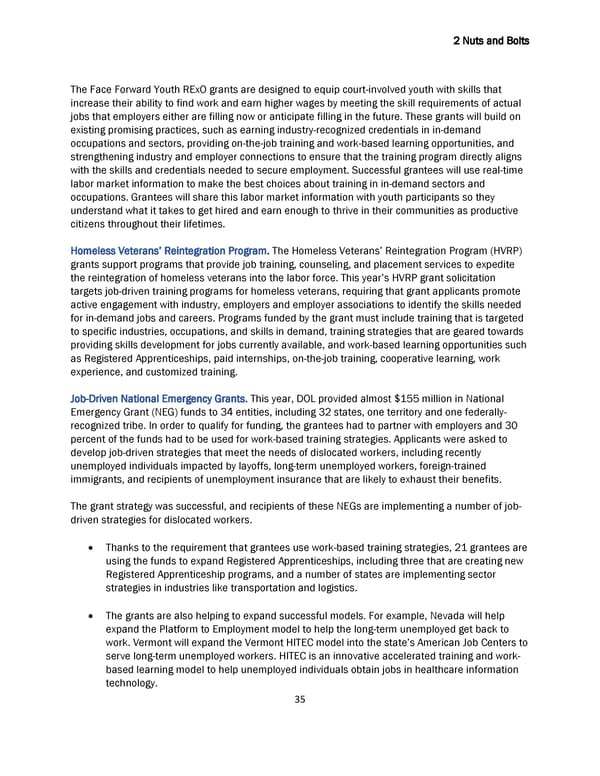2 Nuts and Bolts The Face Forward Youth RExO grants are designed to equip court-involved youth with skills that increase their ability to find work and earn higher wages by meeting the skill requirements of actual jobs that employers either are filling now or anticipate filling in the future. These grants will build on existing promising practices, such as earning industry-recognized credentials in in-demand occupations and sectors, providing on-the-job training and work-based learning opportunities, and strengthening industry and employer connections to ensure that the training program directly aligns with the skills and credentials needed to secure employment. Successful grantees will use real-time labor market information to make the best choices about training in in-demand sectors and occupations. Grantees will share this labor market information with youth participants so they understand what it takes to get hired and earn enough to thrive in their communities as productive citizens throughout their lifetimes. Homeless Veterans’ Reintegration Program. The Homeless Veterans’ Reintegration Program (HVRP) grants support programs that provide job training, counseling, and placement services to expedite the reintegration of homeless veterans into the labor force. This year’s HVRP grant solicitation targets job-driven training programs for homeless veterans, requiring that grant applicants promote active engagement with industry, employers and employer associations to identify the skills needed for in-demand jobs and careers. Programs funded by the grant must include training that is targeted to specific industries, occupations, and skills in demand, training strategies that are geared towards providing skills development for jobs currently available, and work-based learning opportunities such as Registered Apprenticeships, paid internships, on-the-job training, cooperative learning, work experience, and customized training. Job-Driven National Emergency Grants. This year, DOL provided almost $155 million in National Emergency Grant (NEG) funds to 34 entities, including 32 states, one territory and one federally- recognized tribe. In order to qualify for funding, the grantees had to partner with employers and 30 percent of the funds had to be used for work-based training strategies. Applicants were asked to develop job-driven strategies that meet the needs of dislocated workers, including recently unemployed individuals impacted by layoffs, long-term unemployed workers, foreign-trained immigrants, and recipients of unemployment insurance that are likely to exhaust their benefits. The grant strategy was successful, and recipients of these NEGs are implementing a number of job- driven strategies for dislocated workers. Thanks to the requirement that grantees use work-based training strategies, 21 grantees are using the funds to expand Registered Apprenticeships, including three that are creating new Registered Apprenticeship programs, and a number of states are implementing sector strategies in industries like transportation and logistics. The grants are also helping to expand successful models. For example, Nevada will help expand the Platform to Employment model to help the long-term unemployed get back to work. Vermont will expand the Vermont HITEC model into the state’s American Job Centers to serve long-term unemployed workers. HITEC is an innovative accelerated training and work- based learning model to help unemployed individuals obtain jobs in healthcare information technology. 35
 Biden Ready to Work White Paper 7/22/14 Page 34 Page 36
Biden Ready to Work White Paper 7/22/14 Page 34 Page 36